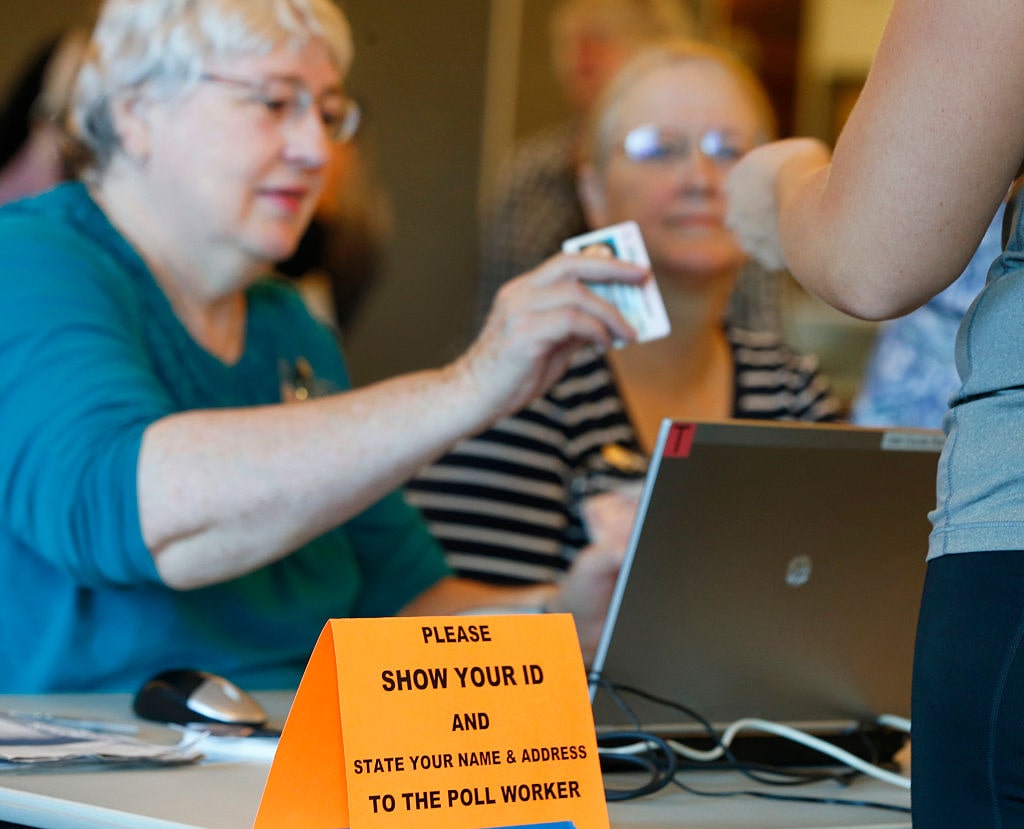



Loading the Elevenlabs Text to Speech AudioNative Player...
A federal judge has blocked parts of President Donald Trump’s election security executive order. On Thursday, April 24, DC District Judge Colleen Kollar-Kotelly ruled that states don’t have to make voters show ID at the polls or show proof of citizenship to register. Trump is a fan of voter ID requirements, and so are most Americans, according to polling. But if the Constitution doesn’t support that position, then neither public opinion nor the president’s order makes it legal.
There are plenty of issues the Constitution doesn’t explicitly mention, making it difficult and, frankly, subjective to determine which side is correct. This, however, is not one of them. Voter ID isn’t stated specifically, but it’s clear whose responsibility it is to establish the rules.
Each state is explicitly granted the authority to determine when, where, and how US senators and representatives are elected. Then there’s an exception to that authority: Congress can legislate it at any time (well, all except the polling places). Note the lack of authorization for a president to override the states. The federal government can step in, but it has to be through the standard legislative process – a bill must be passed through the House and Senate and then signed by the president. And such a bill is, in fact, in the works.
Liberty Nation depends on the support of our readers. Donate now!
Judge Kollar-Kotelly made precisely that point in the ruling: “Consistent with that allocation of power, Congress is currently debating legislation that would affect many of the changes the President purports to order. No statutory delegation of authority to the Executive Branch permits the President to short-circuit Congress’s deliberative process by executive order.”
Interestingly, there’s no matching text in the Article II text establishing the executive branch that delegates “The Times, Places and Manner of holding Elections” for presidents and vice presidents to the individual states. It does, however, authorize Congress to “determine the Time of Chusing the Electors, and the Day on which they shall give their Votes; which Day shall be the same throughout the United States.”
Still, no carveout for presidential power over this process exists.
Just before the 2024 election, Gallup polled Americans and found that 84% of respondents favored requiring voters to show ID, with 83% supporting states requiring proof of citizenship when registering for the first time. What’s perhaps most surprising about that number is the party breakdown. While it’s no shocker that 98% of those identifying as Republican supported a voter ID requirement, so did 84% of independents and 67% of Democrats. Proof of citizenship at the time of first registration saw similar numbers, with 66% of Democrats, 84% of independents, and 96% of Republicans in favor of it.
It’s popular among GOP lawmakers, as well. So far, five states require Voter ID, and another 40 are considering legislation that requires either ID at the polling place, proof of citizenship at registration, or both. Rep. Chip Roy of Texas introduced a bill in the US House of Representatives that would require states to record proof of citizenship at registration and to remove all non-citizens from the rolls. “In order to preserve this republic, we must uphold what it means to be able to vote in a U.S. election,” Roy said after the House passed his legislation 220-208 on April 10. The Safeguard American Voter Eligibility (SAVE) Act must now pass the Senate, where it will have to gain at least a little Democratic support to make the 60-vote threshold.
If it does manage to pass the upper chamber, there’s no reason to suspect Trump wouldn’t sign it. Such a law – passed by both houses of Congress and signed by the president – would, in fact, fit right into the framework provided by the Constitution. As Judge Kollar-Kotelly points out, however, an executive order may not quite cut it.
Liberty Vault: The Constitution of the United States
